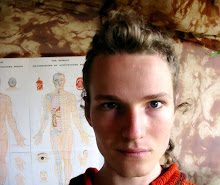
habits that help me both appreciate my food more and regulate how much i eat:
- take the time to smell food. opening the olfactory sense starts the digestion process by forwarning the body of what it is consuming and allowing it to prep the appropriate digestive enzymes. smell is also very connected with the emotions and gives important information about how we feel towards the food on a deeper level. food will often also stop smelling so good when we don't actually need any more.
- take the time before and during eating to smack your mouth and swallow rhythmically. feel how the smooth muscle pulsations travel down through the esophagus, to the stomach, into the small intestines, up/across/down through the L intestines, and to the anus - the whole gut tube from top to bottom. connect with the sensation of your oral/anal pulsatory rhythm - yourself as a internal tube from top to bottom. awareness of the gut body highlights how our consumptive (needs & desires), integrative (nourishment & discretionary), and elimination (what we do not need or cant integrate) functions are feeling in the moment. this also helps food to move along, and sensitizes one to the messages of the digestive system.
- use chopsticks!
- take moments to pause, appreciate, and bless
- chew more - and even though it might be considered rude (it matters less when we are eating alone) try smacking your mouth while chewing. this mixes air with the scent of the food being broken down by saliva enzymes and blows it out the nose - increasing our experience (smell and taste) of the food. in oriental cultures this is the polite way to eat and appreciate food - chewing quietly means that you are trying to minimize how much you are tasting - and that you do not appreciate or like the food - especially when someone has prepared it for you.
- see how far down you can continue experiencing food after swallowing
all of this really speaks to me about sensitizing oneself to the present moment experience - in this case of eating. by opening ourselves to the moment and listening in with all our senses, our experience comes alive, we comes into consciousness, and the self-regulating genius of our being is allowed to express itself.
we become connoisseurs of experience.
